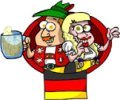HOT words! Learn some French heat words.
French Heatwave - la canicule suffoque
During my stay in Paris back in July 2005, in fact, during the Bastille celebrations, a heatwave descended on the country.
Learn some useful French heatwave terminology!
I took an article from the French newspaper Le Figaro, plucked some of the useful sentences from it, then dissected it here for you, enabling you to learn / practise / reinforce / remember some hot French words. Hot!
La Canicule Suffoque
That was the title, and it said it all about the French heat wave in July 2005! The Scorching Heat (or the Heatwave) Suffocates.
- the term heatwave is also used: la vague de chaleur.

chaud = hot
Imagine it being hot at the SHOW!
La canicule s'installe à nouveau dans le pays!
Literally translated from French this says: The Heatwave installs itself again (newly) in the country.
During la canicule a CAN O'COOL drink can help cool you down.
la canicule is scorching heat, a heatwave and is a feminine word.
Remember this with the image of a CAN-CAN dancer who enjoys a CAN O' COOL drink to cool her down in the scorching heat.
You will notice that it said la canicule s'installe.
s'installer is reflexive, which we know by seeing the s' which is abbreviated before the vowel from se.
à nouveau or de nouveau both mean again, or literally anew.
The newspaper Le Figarofurther reported about the scorching French heat ....
... partout ailleurs des villes ont connu des températures bien au-dessus des normales saisonnières.
…and everywhere else the towns have experienced (literally: have known) temperatures well above those that are seasonally normal.
Users of the 200 Words a Day programs will recognise most of the words in these sentences.
Aujourd'hui, le mercure devrait largement dépasser les trente-cinq degrés à Lyon, Paris ou Montpellier.
Here Le Figaro has used the word dépasser which can mean to pass in French, but actually more accurately means to supercede, to exceed, to overtake.
In other words, there is more of a connotation of exceedance in the act of dépasser compared to the French word passer, which could have just as correctly been used, but it would not have given that sense of 'extra ooopmh' in the act of passing.
Making French Adverbs by adding the Suffix '-ment'
Notice the use of the French word largement which means largely.
Many French words can be made into adverbs in the same as we do in English by taking the adjective and adding the suffix, (or ending), of -ment, where in English we would have had added the suffix -ly.
Other common examples are: rapidement which means rapidly in French...
You'll also hear a great deal: franchement which is the French word for frankly
doucement which means gently, or slowly in French
uniquement which means only, solely or uniquely in French.
...the article continued on about July's French heat...
Le ministre de la Santé, Xavier Bertrand a annoncé hier le déblocage de 26 millions d'euros pour aider les établissements accueillant des personnes âgées à renforcer leurs effectifs.
The Health Minister Xavier Bertrand announced yesterday the release (literally the de-blocking) of 26 million euros (note the use of d'euros - literally of 26 millions of euros, and note the French use 26 millions, whereas we would say in English 26 millions.... but of course the final '-s' remains silent before a consonant).
Les chaleurs exceptionelles s'accompagnent de pics d'ozone dans quatre régions du pays.
Literally: These exceptional/unusual heat(s)are accompanied by peaks in ozone (levels) in four regions of the country.
le pic
means the peak.... in French, and also means a pick as in a pick-axe that you use to climb a mountain-peak, from whence you might take a peek at the scenery. If you imagine Sir Edmund Hillary with his PICK on a PEAK, you have two male words in one with Sir Edmund as the Gender Trigger.
More hot French words to learn and practise! la chaleur means heat
La sécheresse continue de sévir.
The drought continues to punish.
la sécheresse is French for drought, or dryness. for example dryness of your skin. A feminine word.
You will recognise its roots in the word sec which means dry in French, the feminine for which is sèche.
Note the accents are different for the masculine and feminine!
. . . and we can add the suffix '-ment' to the feminine adjective to get the French adverb for drily, which is of course sèchement
Other good words related to the sec and sèche family.
un séchoir is a drier.
Given that you can dry yourself, and most things that you can do to yourself are reflexive, sécher when used reflexively becomes se sécher.
Note again the use of accents and graves with different words in the family. It is no huge deal in practical terms, but if you really want to get it right. . .
Someone who drinks straight whisky or alcohol says,Je le bois sec."
I drink it dry.
sévir means to crack down, to punish, to treat severely in French.
Cinquante départements sont déjà touchés par des restrictions de consommation d'eau.
Translated means: Fifty departments are already affected by restrictions on the consumption of water.
Other words and phrases used about the July French heat that blasted them:
la vague de chaleur exceptionelle
heatwave, literally a wave of heat exceptional (as in unusual).
There you go, loads of French heat and heatwave words.
Hot stuff!
Learn more words like those on French Heat using Excelerated Language Learning techniques.
Hot Words about the French Heat!
200 Words a Day! - Excelerated French Language learning software and Exceltra
©Copyright
2004-2023 All Rights Reserved
IMAGINE how you'd
FEEL
seeing yourself learning at a rate of 200 words a day ... the ideal companion course that complements any language course.
|










New! Comments
Have your say about what you just read! Leave us a comment in the box below.